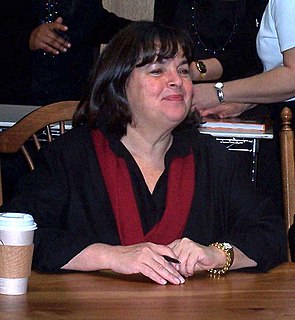A Quote by Andrew Robertson
The food bank is something I've always supported because there's no excuse for anyone to go without food.
Related Quotes
I think there are two ways of eating, or cooking. One is restaurant food and one is home food. I believe that people have started making food that is easy that you want to eat at home. When you go out to a restaurant, you want to be challenged, you want to taste something new, you want to be excited. But when you eat at home, you want something that's delicious and comforting. I've always liked that kind of food - and frankly, that's also what I want to eat when I go out to restaurants, but maybe that's me.
Go to the farmers market and buy food there. You'll get something that's delicious. It's discouraging that this seems like such an elitist thing. It's not. It's just that we have to pay the real cost of food. People have to understand that cheap food has been subsidized. We have to realize that it's important to pay farmers up front, because they are taking care of the land.
If there was ever a food that had politics behind it, it is soul food. Soul food became a symbol of the black power movement in the late 1960s. Chef Marcus Samuelsson, with his soul food restaurant Red Rooster in Harlem, is very clear about what soul food represents. It is a food of memory, a food of labor.
Food is "everyday"-it has to be, or we would not survive for long. But food is never just something to eat. It is something to find or hunt or cultivate first of all; for most of human history we have spent a much longer portion of our lives worrying about food, and plotting, working, and fighting to obtain it, than we have in any other pursuit. As soon as we can count on a food supply (and so take food for granted), and not a moment sooner, we start to civilize ourselves.
My father once said there's a correlation between a nation's cuisine and its people: England, nice people, nasty food; France, nice food, nasty people; Spain, nice people, nasty food; Italy, nice people, nice food; and Germany, nasty food, nasty people. And I've always thought that there must be something terribly wrong with the German character - and that there is, really.
Bad food is made without pride, by cooks who have no pride, and no love. Bad food is made by chefs who are indifferent, or who are trying to be everything to everybody, who are trying to please everyone... Bad food is fake food... food that shows fear and lack of confidence in people's ability to discern or to make decisions about their lives.
Bad food is made without pride, by cooks who have no pride, and no love. Bad food is made by chefs who are indifferent, or who are trying to be everything to everybody, who are trying to please everyone. Bad food is fake food, food that shows fear and lack of confidence in people's ability to discern or to make decisions about their lives.
We need to realize that these industrial methods of farming have gotten us used to cheap food. The corollary of cheap food is low wages. What we need to do in an era when the price of food is going up is pay better wages. A living wage is an absolutely integral part of a modern food system, because you can't expect people to eat properly and eat in a sustainable way if you pay them nothing. In fact, it's cheap food that subsidized the exploitation of American workers for a very long time, and that's always been an aim of cheap food.





































